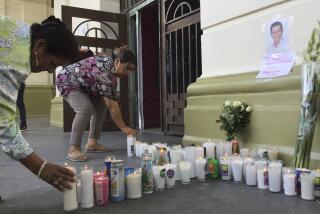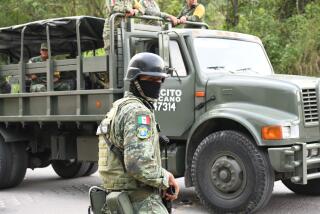Violence unabated in Tijuana
TIJUANA — At least 38 people have been killed in Tijuana since Saturday, nine of them decapitated, in escalating drug-related violence that appears to have left in tatters a Mexican military offensive launched two weeks ago.
The killing spree marked the end of the tenure of the city’s top law enforcement official. Secretary of Public Security Alberto Capella Ibarra was removed from his post Monday evening after a year marked by upheaval in the police ranks and increasing violence.
Dozens of soldiers and federal agents patrolling the eastern part of the city have failed to stop the killings between rival drug cartels, which continue brazen and brutal attacks across Tijuana.
Three of the nine decapitated bodies discovered in an empty lot Sunday were those of police officers, according to the Baja California attorney general’s office. On Saturday night, two brothers, 4 and 13 years old, were gunned down along with their father outside a grocery store, authorities said.
The nephew of Baja California’s tourism secretary, Angel Escobedo, was found fatally shot inside his car Saturday morning. In nearby Rosarito Beach, police over the weekend discovered a dismembered body in a car outside a taco stand, and another outside a small church.
Since the latest military-led operation began Nov. 18, at least 70 people have been killed in Tijuana, according to the attorney general’s office. More than 350 have died since rival drug gangs began battling in late September.
At a news conference in Tijuana, Mexican authorities claimed progress, saying local, state and federal law enforcement agencies were showing increasing cooperation.
They cited as evidence the October arrest of Luis Ramirez Vasquez, alleged to be a key member of the Arellano Felix cartel, as well as large seizures of weapons and the destruction of five tons of marijuana.
“This situation is critical . . . but we have made arrests,” said Martin Rubio, the representative for the federal attorney general’s office in Tijuana.
Over the last several weeks, federal forces have fanned out across the eastern part of the city to replace about 500 police officers who were sent out for retraining. The move was an attempt to weaken crime boss Teodoro Garcia Simental, who allegedly controls drug trafficking in much of eastern Tijuana.
Critics say the situation has deteriorated. Crime rates have increased in the areas patrolled by the federal forces because they are unfamiliar with the city, the critics say.
And because the soldiers patrol in slow-moving vehicles, the forces are unable to chase down cartel gunmen, who travel in convoys of souped-up SUVs and late-model trucks, they say.
“The military is ineffective because they’re accustomed to working in rural areas, not urban settings,” said one Mexican law enforcement official who spoke on condition of anonymity. “They’re too slow.”
City officials provided few details about Capella’s ouster, aside from saying the current police director, Julian Leyzaola, would take over. Capella, an attorney and former victims’ rights activist, repelled an attack on his home by armed gunmen a few days before taking the job last year, and his reputation for honesty generated hopes among residents.
But Capella was unable to gain control of a department long plagued by corruption. Before his removal from office, he had recently submitted his resignation because he wasn’t receiving enough resources to improve the force, according to law enforcement sources who spoke on condition of anonymity because they were not authorized to speak on the issue.
--
More to Read
Sign up for Essential California
The most important California stories and recommendations in your inbox every morning.
You may occasionally receive promotional content from the Los Angeles Times.











